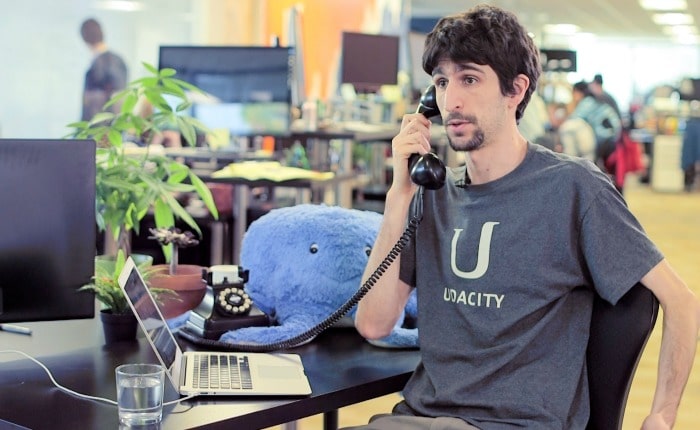In the first two parts of this three-part series, we took a look at two very different paths to professional web developer: Michael Wales, who always knew what he wanted to do, and did it from childhood; and Cameron Pittman, who hit upon this career by accident as an adult, but who at least had a background in the sciences.
So, ‘OK,’ you may be thinking, ‘A background in hard science is not altogether different from computer programming.’ What if you studied, or have been working in, a wildly divergent field like art, or history, or psychology?
Consider Ben Jaffe.
Ben is a multi-talented musician, skilled in piano, clarinet, bass clarinet, guitar, harmonium, flute, saxophone, and bass. He was a theater major in college, focusing on sound and lighting design. He’s an experienced teacher, as well as a media designer, having freelanced from 2009 to 2012 doing video editing, motion graphics, audio recording, live mixing, and music composition.
He’s also a professional web developer, currently employed as a course developer at Udacity.
If Ben’s background isn’t evidence that you can truly construct a career as a web developer from the ground up, then there is none. But how did he become interested in web development, anyway? “I always liked programming and playing around with computers,” he said. “I kind of kept doing that on the side. I was teaching film and visual effects at a summer camp. From there, I ended up teaching some web technology, then ended up doing more with it outside of the classroom. So I actually started out teaching development before I was doing it.”
Teaching, Ben suggested, is one of the best ways to learn. It helped him learn that he had a strong interest in pursuing development seriously. He encourages students to not only learn from a teacher (online or offline), but to also teach themselves and each other.
Ben channeled his self-taught coding smarts into a job as the lead front-end developer at a San Francisco Bay area startup, developing the company’s website, mobile-optimized consumer web app, iPhone and Android apps with Cordova, and the initial skeleton for the platform’s venue portal. By fall 2014, he had joined the Udacity crew and hasn’t looked back—except to reflect, when prompted, on how his colorful background has served him well as a developer.
Ben’s indirect path from technical theater expert to professional developer paid off by making it clear to him how much he was interested in the work. “The route I took is evidence that I really enjoy it,” he said. “A lot of people go into computer science because there’s money in it. If that’s the reason you’re in it, you’re not going to find it as compelling and interesting as someone who’s in it because they really like to do it. If you’re in it because you really like to do it, you’re also going to implicitly be better at it. The best web developers are going to be the developers for whom web technology is exciting.”
One of the things Ben finds most exciting about web development is when he’s playing with web technologies that aren’t quite ready. “Right now, I’m trying to build something, and the particular features I need aren’t actually stable in the browser yet,” he said, “It’s a matter of constantly hacking around things and trying to find ways to get the darn thing to work.”
He wants to embolden students to be as genuinely excited by web development as he is, seeking out their own projects outside of classes they’re taking and swapping ideas and insights with others. As far as resources Ben has turned to for inspiration and insight, there is one specific book he greatly benefited from: Douglas Crockford’s JavaScript: The Good Parts. He said, “I read that on my Kindle as I traveled around Europe, including one very long night in Heathrow’s Terminal 5 Departures area. It’ll take you from understanding JavaScript to really understanding it.
Today he uses, perhaps surprisingly, reddit—not as a source of entertaining memes, gifs, and AMAs (Ask Me Anything), but as a way to keep up-to-speed with the web industry. He subscribes to r/javascript, r/web_design, and r/css, plus r/music and r/astronomy to feed his passion for those two fields. “I’ve set up my online surroundings in a way that helps me learn, stay ahead of the curve, and ultimately, succeed,” he said. “The more you surround yourself with resources, and the more you consume them, the more you’ll learn. Learning doesn’t have to be ‘on’ time. If you set your environment and mindset properly, learning can be all the time.”
The Takeaway
Having a wide range of interests can serve you well as a developer if you find the through line that ties them all together. In Ben’s case, the patterns that underlay mathematics, music, and code are fascinating to him, which helps him think ultra-creatively and abstractly. There’s a reason career experts tell you to follow your passion: not only will you be the most stimulated and fulfilled, you’ll be better at your work.
The Bottom Line
Can you build a career as a web developer from scratch? In short, absolutely. Learning is a lifelong activity, and every journey is personal. Take inspiration from Michael’s, Cameron’s, and Ben’s stories that, no matter the start of your own story, it can end like theirs.



